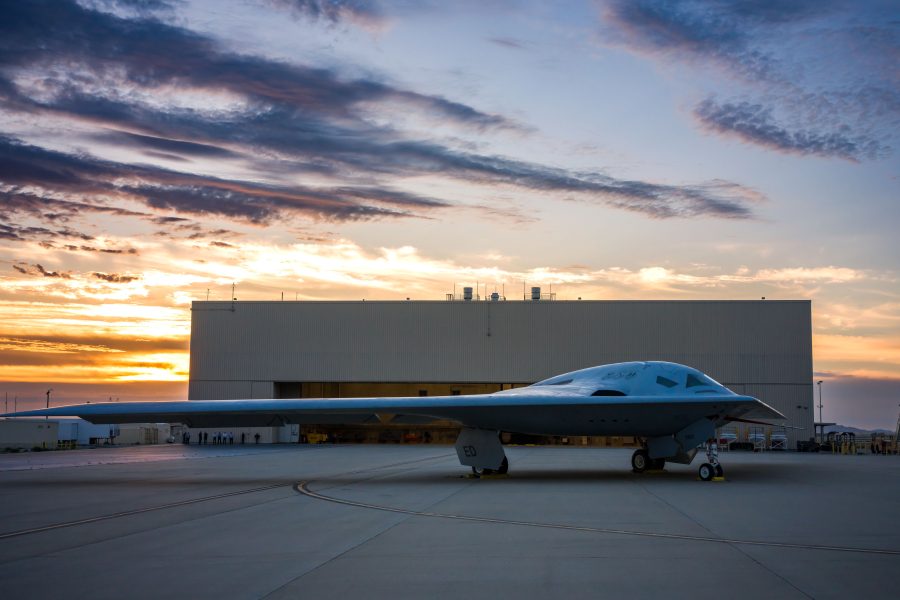The first B-21 Raider bomber took off from Air Force Plant 42 in Palmdale, Calif., just after dawn on Nov. 10, in a flight that concluded at Edwards Air Force Base, Calif, after 90 minutes, according to local observers.
“The B-21 safely landed,” said Air Force spokeswoman Ann Stefanek. “This was a test flight.”
The aircraft was filmed from outside Plant 42, heading eastbound with an F-16 chase plane after climbing to about 500 feet. The landing gear had yet to be retracted in video and photos that appeared on social media.
The aircraft appeared to be trailing a lengthy cable from the upper surface of the tail on the port side, near the exhausts.
An Air Force spokesperson confirmed reports by individuals watching from outside the gates that the aircraft took off at approximately 7 a.m. local time and landed at Edwards at approximately 8:30 a.m. local time.
The event fulfills the prediction by manufacturer Northrop Grumman and the Air Force that the new stealth bomber would fly before the end of 2023, and clears the way for the Air Force to issue a low-rate initial production contract for the bomber.
The duration of the flight suggests that the flight could have been more than a ferry hop to Edwards and that a test card may have been conducted, which can evaluate flying qualities. Flight tracking websites indicated the aircraft was flying a roundabout pattern between Palmdale and Edwards.
The service did not immediately release imagery, and the flight was not announced beforehand, which is consistent with the Air Force’s statements that the bomber would fly when it was ready to and not according to a calendar schedule.
“As confirmed by the U.S. Air Force, the B-21 Raider is in flight test,” Northrop Grumman spokesperson said. “The robust flight test campaign is being executed by a Combined Test Force comprised of Northrop Grumman and Air Force personnel that will validate our digital models and moves us another step closer to reaching operational capability.”
Flight testing “is a critical first step in the test campaign managed by the Air Force Test Center and 412th Test Wing’s B-21 Combined Test Force to provide survivable, long-range penetrating strike capabilities to deter aggression and strategic attacks against the United States, allies, and partners,” Stefanek added.
The first operational B-21s will be based at Ellsworth Air Force Base, S.D., while maintenance will be managed at Tinker Air Force Base, Okla.
Six test aircraft are being produced now. The test aircraft are being built on the same production line, using the tools, processes, and technicians that will be used for production aircraft.
The Air Force has previously said that B-21 test aircraft will be “usable assets” as soon as they are airworthy, and that the test aircraft will be converted to operational configuration after developmental and operational testing is complete.
The contract for the B-21, originally called the Long-Range Strike Bomber, was awarded in 2015, and the aircraft is expected to cost around $700 million each in current dollars.
The B-21 was officially named the “Raider” in 2016, to honor the Doolittle Raiders of World War II that carried out the first airstrikes against Japan.
Northrop Grumman president and chief executive officer Kathy Warden has acknowledged that, due to the fixed-price nature of the program, inflation, and labor costs in recent years, the company will earn “zero” profit on the initial production contract. However, the company has said it expects to receive a $60 million adjustment from the Air Force to mitigate those additional expenses.
